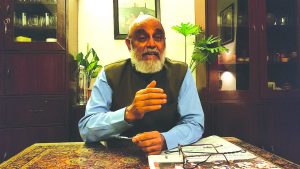 Eminent security expert and deputy director, Institute of Defence and Strategic Analysis, Uday Bhaskar points out that the US could be relied upon to support India’s fight against terrorism, if things come to a crunch. He strongly suggests that India should look at the UN Resolution 1373 as the base for all negotiations, saying that this would force Pakistan to the back foot. Excerpts from the interview:
Eminent security expert and deputy director, Institute of Defence and Strategic Analysis, Uday Bhaskar points out that the US could be relied upon to support India’s fight against terrorism, if things come to a crunch. He strongly suggests that India should look at the UN Resolution 1373 as the base for all negotiations, saying that this would force Pakistan to the back foot. Excerpts from the interview:
Edited Excerpts from an interview •
There is much talk about the Indian government taking “firm action”. Would this translate into an attack on Pakistani military camps? If it is, do you think that would advisable, given the current international situation?
No. At this point, we must think prudently, consider the diplomatic space available to us, and react accordingly. We must not be emotive. We must handle Pakistan diplomatically, and only within the space we can intrude upon diplomatically. Bombing a country is not the only way to handling a situation.
So…what then do you think is advisable now?
The best option now would be the United Nations Security Council Resolution 1373, which urges member states to extend support towards meeting the threat of terrorism with counteractions, and preventing further encouragement of terrorist activity. This puts a responsibility on all countries to fight international terrorism. In accordance with that, Pakistan would have certain obligations to perform as a member state. This would make it mandatory for Pakistan to work as per the rules, and non-compliance with the resolution would make them liable to penalty.
Indirectly, Pakistan will be obliged to view the situation carefully. Russia, Britain and Mauritius are monitoring the implementation of the resolution, and they will not let Pakistan be an exception to an international order. They will collectively exert pressure on Pakistan, and India will get what it wants.
Would this be sufficient?
Of course, Pakistan will then have to deal with these groups (Lashkar-e-Toiba and Jaish-e-Mohammad) on its own. This would be an efficient way of dealing with issue now. It is also well within the borders of diplomacy that the Indian government has been so successfully following.
But will war not be the better way out to decide a conflict that the two countries have been fighting ever since independence? What do you think of Pakistan’s position now?
Pakistan has already changed its policy several times, the most recent being its Afghanistan policy. The Musharraf regime has received enough flak for harbouring terrorists, and funding terrorist groups. If we bomb them, we will have the whole international community worried about war and its after-effects, especially in view of the nuclear scare today. All these aspects must be kept in mind while deciding on the next step.
With Pakistan being the United States’ new ally, can India expect US help against Pakistan?
America has already offered us their expertise, and the FBI (Federal Bureau of Investigation) is also helping us. Obviously, we must be practical and realise that their main target still remains Al Qaeda and Osama bin Laden. They are more concerned about their own objectives in Afghanistan than with helping us. We should look towards garnering empathy, rather than support, in the current situation. They must acknowledge the cause… We have to be practical; we should not expect outsiders to come and do the needful for us.
Do you think America will exert pressure on Pakistan if needed?
I believe the US’ ban on the two terrorist groups is indication enough that they can pressurise Pakistan.
Going back to the attack on Parliament, do you think it was a security lapse? How do you view the whole incident?
December 13 was just another reminder of the unpredictable conditions and situations that arise in terrorism, and the fight against it. They managed to cross the first ring and enter Parliament, despite checks. This is what happens in a reign of terror. We need rigorous rules and regulations and expertise to prevent recurrence of such incidents.
Why say “lapse” all the time? The term used is wrongly. The security forces behaved in a responsible manner and reacted as they were expected to, sacrificing lives, sustaining casualties, firing and countering fire. This is their duty, and that is what they did. If they had fallen apart, we could have called it a security lapse. Principally, the term is wrong. It wasn’t a lapse; in fact it was entirely the opposite. They saved the day for us. They must be congratulated for saving the day.
letters@tehelka.com











